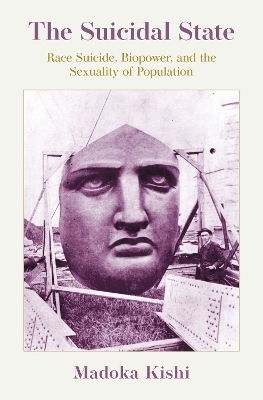
The Suicidal State
Race Suicide, Biopower, and the Sexuality of Population
Seiten
2025
Oxford University Press Inc (Verlag)
978-0-19-769007-9 (ISBN)
Oxford University Press Inc (Verlag)
978-0-19-769007-9 (ISBN)
- Noch nicht erschienen (ca. Januar 2025)
- Versandkostenfrei innerhalb Deutschlands
- Auch auf Rechnung
- Verfügbarkeit in der Filiale vor Ort prüfen
- Artikel merken
Through mapping the entwinement between the turn-of-the-century nativist discourse,
The Suicidal State theorizes a biopolitics of suicide by mapping the entwinement between the Progressive-Era discourse of “race suicide” and period representations of literary suicide. Against the backdrop of the turn-of-the-century debates over immigration restrictions, “race suicide” suggests white Americans' low birth rate as foretelling an immanent extinction of the white race, prefiguring the contemporary white nationalist discourse, “replacement theory.” While race suicide personified the populational subject--the “race”--as a suicidal individual, Progressive-Era literature gave birth to a microgenre of literary suicides, including works by Henry James, Kate Chopin, Jack London, Gertrude Stein, and a series of Madame Butterfly texts.
The Suicidal State argues that suicides in these texts literalize the fear of race suicide as they thwart the biopolitical demands for self-preservation, survival, and reproduction, articulating queer deathways that betray the nation's reproductive imperative. Both in its figuration of race suicide and in literary suicides, self-inflected death is imagined as a uniquely agential act in its destruction of agency, offering a fertile space for the reconceptualization of biopower's subject formation as it traverses individual and social bodies. That is, the book argues that suicide poses a limit case for the biopolitical management over life. Suicide, as it was imagined at the turn of the century, refuses, nullifies, and parries its obligatory relation to both biopower's discipline of the individual and its management of the population, thereby forging new forms of subjectivity and ways of being in the world that sidestep the twin imperatives for preservation and procreation. In tracking these queer potentialities of suicide, The Suicidal State offers a new history of sex and race, of the relation between individual and collective, of the formation of a biopolitical state that Foucault calls a “racist State, a murderous State, and a suicidal State.”
The Suicidal State theorizes a biopolitics of suicide by mapping the entwinement between the Progressive-Era discourse of “race suicide” and period representations of literary suicide. Against the backdrop of the turn-of-the-century debates over immigration restrictions, “race suicide” suggests white Americans' low birth rate as foretelling an immanent extinction of the white race, prefiguring the contemporary white nationalist discourse, “replacement theory.” While race suicide personified the populational subject--the “race”--as a suicidal individual, Progressive-Era literature gave birth to a microgenre of literary suicides, including works by Henry James, Kate Chopin, Jack London, Gertrude Stein, and a series of Madame Butterfly texts.
The Suicidal State argues that suicides in these texts literalize the fear of race suicide as they thwart the biopolitical demands for self-preservation, survival, and reproduction, articulating queer deathways that betray the nation's reproductive imperative. Both in its figuration of race suicide and in literary suicides, self-inflected death is imagined as a uniquely agential act in its destruction of agency, offering a fertile space for the reconceptualization of biopower's subject formation as it traverses individual and social bodies. That is, the book argues that suicide poses a limit case for the biopolitical management over life. Suicide, as it was imagined at the turn of the century, refuses, nullifies, and parries its obligatory relation to both biopower's discipline of the individual and its management of the population, thereby forging new forms of subjectivity and ways of being in the world that sidestep the twin imperatives for preservation and procreation. In tracking these queer potentialities of suicide, The Suicidal State offers a new history of sex and race, of the relation between individual and collective, of the formation of a biopolitical state that Foucault calls a “racist State, a murderous State, and a suicidal State.”
Madoka Kishi is a Professional in Residence in English at Louisiana State University. She has translated Eve Kosofsky Sedgwick's Touching Feeling (Takanashi-shobo, 2022) and co-translated Judith Butler's Parting Ways (Seido-sha, 2019) into Japanese. She has published essays in the Journal of American Studies, The Henry James Review, and the Journal of Modern Literature and is currently co-translating Lauren Berlant's Cruel Optimism for Kadensha (forthcoming, 2024).
Introduction
1. Sacrificial Ecstasy: The Bostonians, Neurasthenia, and the
| Erscheinungsdatum | 24.10.2024 |
|---|---|
| Verlagsort | New York |
| Sprache | englisch |
| Maße | 164 x 238 mm |
| Gewicht | 503 g |
| Themenwelt | Geisteswissenschaften ► Sprach- / Literaturwissenschaft ► Anglistik / Amerikanistik |
| Geisteswissenschaften ► Sprach- / Literaturwissenschaft ► Literaturgeschichte | |
| Geisteswissenschaften ► Sprach- / Literaturwissenschaft ► Literaturwissenschaft | |
| ISBN-10 | 0-19-769007-6 / 0197690076 |
| ISBN-13 | 978-0-19-769007-9 / 9780197690079 |
| Zustand | Neuware |
| Haben Sie eine Frage zum Produkt? |
Mehr entdecken
aus dem Bereich
aus dem Bereich
Poetik eines sozialen Urteils
Buch | Hardcover (2023)
De Gruyter (Verlag)
59,95 €
Buch | Softcover (2024)
belleville (Verlag)
20,00 €


